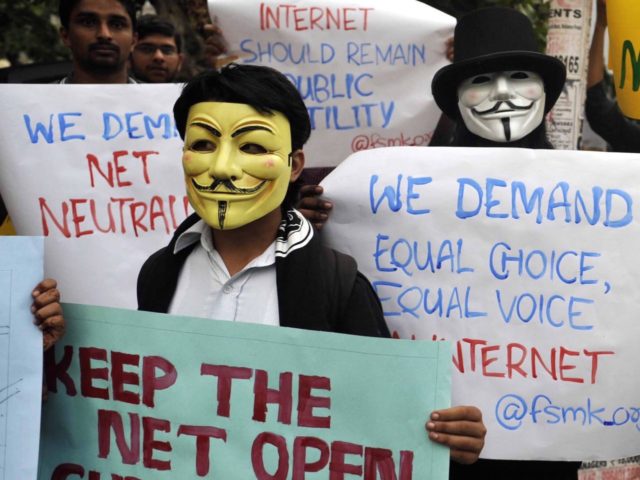A Broadband for America report found that once they accounted for fake email domains and unverifiable international comments, 69 percent of those who filed opinions through the Federal Communication Commission’s (FCC) comment system favored repealing net neutrality.
Broadband for America, an anti-net neutrality organization, commissioned Emprata to analyze the nearly 21 million comments submitted to the FCC’s filing system for the agency’s proposed order to eliminate net neutrality.
The FCC’s 2015 Open Internet Order (OIO) established net neutrality, a rule that regulates the internet like a public monopoly. Advocates of net neutrality argue that the rule would prevent internet service providers (ISPs) from blocking, slowing, or preferring content providers on the internet; opponents of net neutrality argue that the rules would stifle internet freedom.
Broadband for America found that over 7.75 million comments, the largest of any group of comments, were generated by fictitious email domains such as FakeMailGenerator.com. One email domain, Einrot.com, boasts, “No legitimate email will ever be sent from einrot.com.”
Broadband for America also found that 1.72 million comments came from unverifiable international addresses in Russia, India, France, and 26 other countries. Nearly all of the comments submitted from these foreign countries opposed repealing net neutrality.
When analysts accounted for all of the fake comments submitted to the FCC, Emprata found that 69.9 percent of those who submitted comments to the FCC wanted to repeal net neutrality, while only 29.5 percent wanted to preserve the controversial internet regulations.
Breitbart News reported previous studies that found widespread fake comments submitted to the FCC during the agency’s comment period to submit feedback on their proposed rulemaking. The National Legal and Policy Center (NLPC) exposed how some pro-net neutrality advocates used fake email generators and email domains to submit comments to the FCC.
NLPC President Peter Flaherty charged, “Someone or some group is making a complete mockery of our public rulemaking process. Since Congress continues to turn a blind eye to the gaming of the rulemaking process, we’re putting the data online ourselves so Americans can see for themselves just how pervasive the fake comment problem has become.”
Flaherty added, “The deception has not ebbed, and in fact appears to be growing.”
Broadband for America submitted a statement on their findings, “The results of the report shed light on the questionable, fictitious sources of many of the comments, specifically the 7.75 million comments that were submitted using a known fake email generator. The findings further underscore the need for Congressional action to address outdated utility regulations and ensure advances in internet technologies are not hindered. We stand ready to work with lawmakers on both sides of the aisle to ensure durable net neutrality principles are enshrined into law.”
Read Broadband for America’s report here.

COMMENTS
Please let us know if you're having issues with commenting.